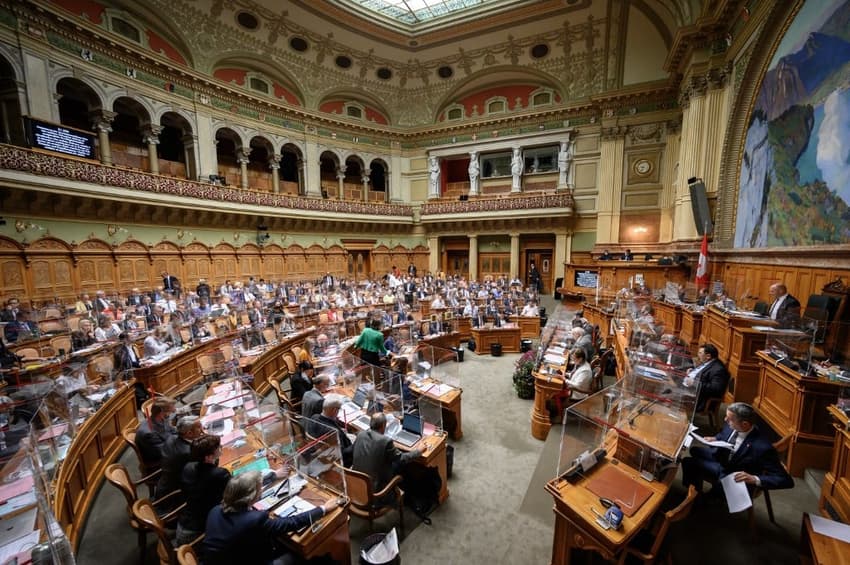Swiss politicians with foreign-sounding names 'face discrimination'

As is the case every four years, Switzerland will re-elect its parliament in October 2023. Research shows that some candidates may be less favourable than others — because of their name.
In a country where about 40 percent of residents have a migration background, not everyone can be surnamed Müller.
Just like the general population itself, many politicians have foreign-sounding names, and that can be a problem if they are running for office in October.
That’s because they have less chances of being elected than candidates with names that don’t betray foreign roots.
This is what emerged from a survey published in SonntagsZeitung on Sunday.
These findings were based on an anlaysis of legislative elections in more than 20 municipalities between 2006 and 2018.
One of the consequences of this discrimination is that people with an immigrant background are under-represented in politics, the survey indicated.
Not surprisingly, the more a party leans to the right, the least likely it is to have MPs and other elected officials who come from immigrant backgrounds.
However, according to political scientist Daniel Auer, who co-authored the study, voters are not the only ones to blame for this bias.
“Party leaders often place people of foreign origin at the bottom of the list, which reduces their chances of being elected,” he noted.
"This is a real problem for Switzerland," said Lea Portmann, the study’s co-author. “In an egalitarian democracy, all citizens should have the same opportunities. This is not the case, however."
In one example citied, Zurich MP Daniel Jositsch might never have become a politician if his ancestors had not changed their names - the original family name is Josselowitsch.
Fortunately for him, Jositsch belongs to the left-wing Social Democratic Party, which is more open to including foreigners in the country’s political and social life.
Backlash against dual nationals
Though many of the politicians with foreign surnames are only Swiss citizens, a number are dual nationals: Jositsch, for instance, though born in Zurich, also has a Colombian passport.
However, politicians from the right have been arguing that dual nationals should not run for political office, because they say their loyalties are divided between Switzerland and their home countries — a notion that has been widely disputed.
In one famous spat in 2020, MP Andreas Glarner from the right-wing Swiss People’s Party, told his Green Party colleague, Sibel Arslan, who is Swiss-Turkish, that she doesn’t understand Swiss values because “there is no law and order in your country".
Glarner spearheaded a push — unsuccessful so far — calling for the prohibition of a second passport for federal MPs.
“This is to ensure that the representatives of the people truly defend the interests of Switzerland, and not another country,” he said.
Comments
See Also
In a country where about 40 percent of residents have a migration background, not everyone can be surnamed Müller.
Just like the general population itself, many politicians have foreign-sounding names, and that can be a problem if they are running for office in October.
That’s because they have less chances of being elected than candidates with names that don’t betray foreign roots.
This is what emerged from a survey published in SonntagsZeitung on Sunday.
These findings were based on an anlaysis of legislative elections in more than 20 municipalities between 2006 and 2018.
One of the consequences of this discrimination is that people with an immigrant background are under-represented in politics, the survey indicated.
Not surprisingly, the more a party leans to the right, the least likely it is to have MPs and other elected officials who come from immigrant backgrounds.
However, according to political scientist Daniel Auer, who co-authored the study, voters are not the only ones to blame for this bias.
“Party leaders often place people of foreign origin at the bottom of the list, which reduces their chances of being elected,” he noted.
"This is a real problem for Switzerland," said Lea Portmann, the study’s co-author. “In an egalitarian democracy, all citizens should have the same opportunities. This is not the case, however."
In one example citied, Zurich MP Daniel Jositsch might never have become a politician if his ancestors had not changed their names - the original family name is Josselowitsch.
Fortunately for him, Jositsch belongs to the left-wing Social Democratic Party, which is more open to including foreigners in the country’s political and social life.
Backlash against dual nationals
Though many of the politicians with foreign surnames are only Swiss citizens, a number are dual nationals: Jositsch, for instance, though born in Zurich, also has a Colombian passport.
However, politicians from the right have been arguing that dual nationals should not run for political office, because they say their loyalties are divided between Switzerland and their home countries — a notion that has been widely disputed.
In one famous spat in 2020, MP Andreas Glarner from the right-wing Swiss People’s Party, told his Green Party colleague, Sibel Arslan, who is Swiss-Turkish, that she doesn’t understand Swiss values because “there is no law and order in your country".
Glarner spearheaded a push — unsuccessful so far — calling for the prohibition of a second passport for federal MPs.
“This is to ensure that the representatives of the people truly defend the interests of Switzerland, and not another country,” he said.
Join the conversation in our comments section below. Share your own views and experience and if you have a question or suggestion for our journalists then email us at [email protected].
Please keep comments civil, constructive and on topic – and make sure to read our terms of use before getting involved.
Please log in here to leave a comment.